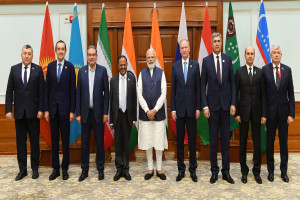
Indian Prime Minister Narendra Modi with the NSA of seven countries, in New Delhi today
New Delhi/Beijing: At the third Regional Security Dialogue on Afghanistan held in New Delhi today, the participating nations, among other things, called for a collective cooperation against the menace of radicalization, extremism, separatism and drug trafficking in the region. The participants agreed to hold the next round in 2022.
Significantly, Afghanistan’s two immediate neighbours China and Pakistan, which were invited to the Dialogue, had expressed their inability to attend it. However, now Pakistan is hosting a troika plus meeting with the US, China and Russia to discuss Afghanistan issues tomorrow. China today said that it supports Pakistan in hosting this extended meeting of the China-US-Russia consultation mechanism and supports “all international efforts conducive to promoting peace and stability in Afghanistan and building consensus among all parties”. It said Yue Xiaoyong, Special Envoy for Afghan affairs of the Chinese Foreign Ministry, will lead a delegation to attend the meeting in Pakistan.
The Delhi Dialogue on Afghanistan was attended by the National Security Advisers / Secretaries of the National Security Councils of India, Iran, Kazakhstan, the Kyrgyz Republic, the Russian Federation, Tajikistan, Turkmenistan and Uzbekistan. The participants discussed the evolving situation in Afghanistan, especially the security situation and its regional and global ramifications. The sides paid special attention to the current political situation in Afghanistan and threats arising from terrorism, radicalisation and drug trafficking as well as the need for humanitarian assistance.
During the meeting, the National Security Advisers / Secretaries of the National Security Councils:
- Reiterated strong support for a peaceful, secure and stable Afghanistan while emphasizing the respect for sovereignty, unity and territorial integrity and non-interference in its internal affairs.
- Expressed deep concern over the suffering of the people of Afghanistan arising from the security situation in Afghanistan and condemned the terrorist attacks in Kunduz, Kandahar and Kabul.
- Emphasised that Afghanistan’s territory should not be used for sheltering, training, planning or financing any terrorist acts.
- Condemned in the strongest terms all terrorist activities and reaffirmed their firm commitment to combat terrorism in all its forms and manifestations, including its financing, the dismantling of terrorist infrastructure and countering radicalization, to ensure that Afghanistan would never become a safe haven for global terrorism.
- Stressed the necessity of forming an open and truly inclusive government that represents the will of all the people of Afghanistan and has representation from all sections of their society, including major ethno-political forces in the country. Inclusion of all sections of the society in the administrative and political structure is imperative for the successful national reconciliation process in the country.
- Recalling the relevant UN Resolutions on Afghanistan, the participants noted that the United Nations has a central role to play in Afghanistan and that its continued presence in the country must be preserved.
- Emphasized the importance of ensuring that the fundamental rights of women, children and minority communities are not violated.
- Expressed concern over the deteriorating socio-economic and humanitarian situation in Afghanistan, and underlined the need to provide urgent humanitarian assistance to the people of Afghanistan.
- Reiterated that humanitarian assistance should be provided in an unimpeded, direct and assured manner to Afghanistan and that the assistance is distributed within the country in a non-discriminatory manner across all sections of the Afghan society.
- Reiterated commitment to provide assistance to Afghanistan to prevent the spread of COVID-19.
- Reiterated the importance of their dialogue and agreed to remain engaged with each other in the future.
The Heads of the National Security Councils of seven nations, also collectively called on Prime Minister Narendra Modi after the completion of the Dialogue. Modi emphasised four aspects that countries in the region would need to focus on, in the context of Afghanistan: the need for an inclusive governement; a zero-tolerance stance about Afghan territory being used by terrorist groups; a strategy to counter trafficking of drugs and arms from Afghanistan; and addressing the increasingly critical humanitarian crisis in Afghanistan.
Prime Minister also expressed the hope that the Regional Security Dialogue would work to revive Central Asia’s traditions of moderation and progressive culture, and counter extremist tendencies.
– global bihari bureau




